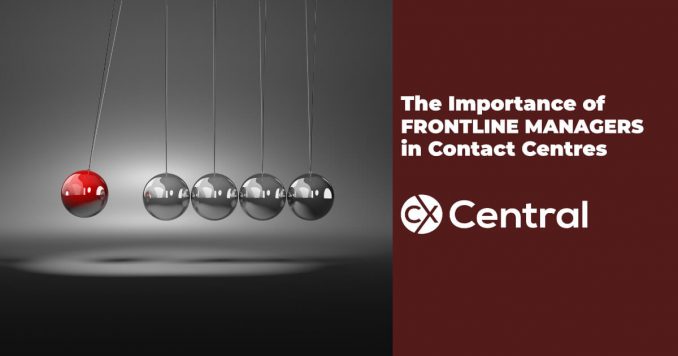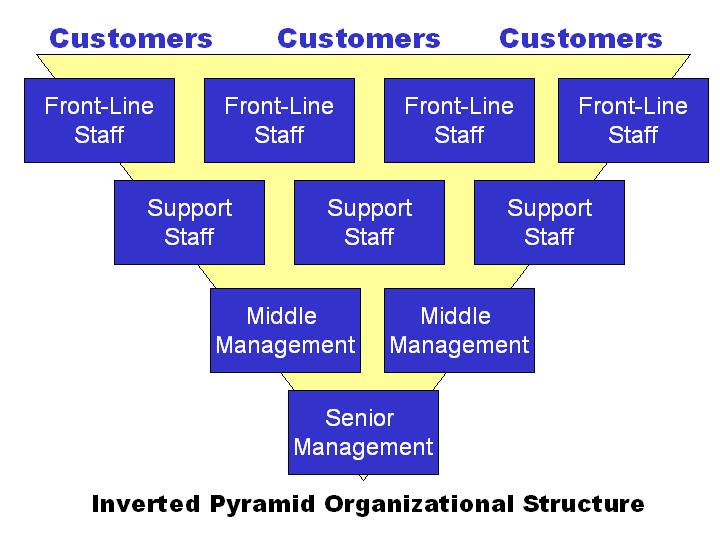
The importance of frontline managers
There is one contact centre job role that trumps all others when it comes to having the biggest impact on the customer experience and the business outcomes that flow from this.
Both the good and the bad.
The managers of frontline staff.
Put simply, the importance of frontline managers and how they conduct themselves in terms of their attitude and activity on a daily basis will influence employee engagement, skills and knowledge.
It will also influence the desire to go above and beyond with customers (not just the bare minimum) far more than any other factor.
As a result, good or great contact centre Team Leaders are worth their weight in gold and then some.
To be successful and truly customer-centric (rather than just saying it), the rest of the organisation needs to be in a position to be constantly supporting those frontline managers and helping them to evolve their capability and behaviour when dealing with staff.
To reflect this thinking more overtly, the classic org-chart needs to be completely inverted with the CEO at the bottom as the primary pillar of support for all others.
Customer-facing staff should be at the top and their frontline managers just one level down.
Now that would reflect a truly customer-centric mindset.
So who is game enough to invert the org chart?
Just mention this as a concept to entrenched corporate types and gauge their reactions.
It reveals plenty about inside-out thinking.

What should a frontline team leader be doing?
A core reason why so many companies continue to deliver sub-standard service is they have failed to grasp the critical importance of the frontline team leader in driving the reality of a brand’s delivery as opposed to the brand promise.
So many organisations squander millions on the latest cultural change or CX program while large swathes of their frontline managers spend their days functioning as ‘glorified administration assistants’.
Considering the turnover and brain drain of the most talented personnel in frontline operations, the wheel just keeps spinning for far too many companies, history repeats itself and consumers cop it big-time.
Every consultant (non-tech) manager or frontline staff member with more than 10 years+ experience in the contact centre industry knows the truth of how everything old becomes new again (e.g. it’s been ‘the year of the customer’ every year since about 1993!).
My work over more than two decades in the customer contact space has revealed that most business are typically quite effective at executing the basic fundamentals of sales and service delivery, maintaining compliance to policy and process, trying to minimise rework and costs and creating some level of basic satisfaction for staff and customers.
Basically executing that ‘ol thing called customer service.
However, there’s only a few organisations that have enough of their frontline managers actively showcasing the critical behaviours needed to drive consistently superior customer experiences.
The type of experiences that exceed expectations and create goodwill towards the company, it’s service and its people.
Experiences that stimulate increased purchasing behaviour, advocacy, and retention that directly impacts the bottom line of the organisation in a significantly positive way.
So why do so many contact centre Team Leaders struggle to break free of chasing their tail, dealing with operational fundamentals and just trying to keep their head above water?
In other words, surviving but not thriving. There is one great missing link in the effective management equation.
To have coaching as the primary job function and capability of frontline managers.
The importance of being a coach, not a manager
At least 80% of a frontline manager’s time should be invested in coaching and development in order to drive continued growth and evolution in culture and performance and extract maximum outcome from effort.
In essence, a range of skills and competencies centred around the concept of ‘The Manager as Coach’.
Unfortunately, most team leaders are not coaches and very few frontline operations have strong coaching cultures.
In fact, most staff and managers who work in customer contact operations have NEVER seen or experienced a strong coaching culture and all the benefits it brings.
Many team leaders think they’re coaching but rather they simply provide feedback and advise what staff need to do better (do what I say not what I do).
“So if coaching isn’t front and centre in a Team Leader’s arsenal, then who is helping staff apply and refine the engagement and needs discovery behaviours that influence positive emotions, first contact resolution, buying behaviour and customer advocacy (e.g. NPS)”?
Where are the opportunities to practice conversation skills in a supported, non-assessment based environment before trying things out with customers?
Where is the demonstration by the manager of what they expect staff to do?
Can they walk the talk?
In other words, ‘show, don’t tell’.
Of course, there are quite a number of frontline managers who live and breathe this as core to their role and they know the positive impact they have as a result.
They also know they are in the minority.
How Frontline Managers need to stand out
Effective and regular coaching is what’s needed if you wish to stand out from the pack and maximise opportunities to acquire and retain customers that come your way each and every day.
It’s the difference between converting sales at a service industry average of 30% (basically just order taking) and 40%+.
What’s a 1% improvement in sales conversion or retention outcomes worth to your bottom line?
What’s 5% worth?
What would 10% or 15% improvement deliver?
Definitely worth the investment in building coaching capability as the primary tool for success when you run the numbers.
So if you want to be a truly customer-centric organisation that delivers consistently better than average experiences that drive real bottom-line impact, then a focus on the coaching skill-sets and behaviours of your frontline managers should be front and centre in your improvement strategy.
…And don’t forget to put the CEO at the bottom of your org chart!
Recommended further reading: 5 Common Barriers to a Contact Centre Team Leaders Success
Search a list of all upcoming industry training courses, conferences, site tours and more on the Industry Events Calendar >>>


Be the first to comment